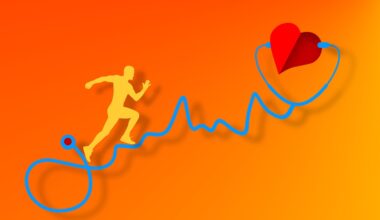Sleep Disorders Common Among Athletes and How to Address Them
Sleep disorders are increasingly recognized as a significant issue among athletes, presenting challenges that can impact both performance and overall well-being. Common sleep disorders include insomnia, sleep apnea, and restless legs syndrome, which can affect an athlete’s ability to recover after intensive training or competition. Insomnia can result from high levels of stress and anxiety, leading to issues in falling or staying asleep. It’s essential for athletes to recognize these signs early to implement effective strategies. Sleep apnea, characterized by pauses in breathing during sleep, may lead to excessive daytime fatigue and consequently decreased athletic performance. Additionally, restless legs syndrome can cause discomfort that makes restful sleep difficult, affecting recovery and training intensity. Therefore, raising awareness about these disorders is crucial. This awareness will enable athletes to seek proper assessment and treatment from healthcare professionals. Understanding the manifestations of these conditions can contribute to comprehensive care and performance optimization. Strategies such as implementing good sleep hygiene practices are also vital. Prioritizing sleep not only aids athletes but enhances athletic development. Understanding these disorders sets the stage for improvement.
A holistic approach to sleep management is essential for athletes facing sleep disorders. It encompasses several techniques and strategies that promote better sleep quality. First, creating a consistent sleep routine can help regulate the body’s internal clock. Athletes should aim to go to bed and wake up at the same times daily, even on rest days. This routine facilitates a smoother transition into sleep, as the body learns to recognize sleep cues. Furthermore, an environment conducive to sleep is paramount. Dark, cool, and quiet spaces contribute significantly to sleep quality. Athletes might benefit from utilizing blackout curtains, earplugs, or white noise machines to eliminate disruptions. Moreover, electronic devices should be avoided at least an hour before bed, as blue light exposure interferes with melatonin production—this hormone helps regulate sleep-wake cycles. Nutrition also plays a vital role; avoiding heavy meals, caffeine, and alcohol close to bedtime is beneficial. Finally, relaxation techniques such as yoga, meditation, or deep breathing can significantly reduce pre-sleep anxiety. This combination of strategies forms a robust framework for athletes to combat sleep disorders effectively and improve their performance.
Impact of Sleep on Athletic Performance
The connection between sleep and athletic performance cannot be overstated. A single night of inadequate sleep can impair decision-making, reaction times, and overall endurance. Athletes need optimal amounts of restorative sleep to recover fully from training stressors. Sleep influences hormone regulation and energy levels, both critical for peak performance. For example, growth hormone release occurs predominantly during deep sleep, impacting muscle recovery and growth. Additionally, a well-rested athlete displays enhanced physical performance, improved cognitive functions, and reduced risk of injury. Conversely, chronic sleep deprivation can lead to serious health issues, including weakened immune function and increased risk for chronic conditions like cardiovascular disease. Athletes that prioritize sleep often experience better mood regulation and focus, leading to improved sports performance. Lack of sleep not only impairs training adaptation but can also lead to burnout due to increased irritability and stress levels. As a result, a consistent sleep schedule helps athletes maintain competitive advantages. It’s important to note that individual sleep needs may vary, but aiming for approximately 7 to 9 hours per night is generally recommended to optimize performance.
To properly address sleep disorders, athletes should consider consulting various professionals who specialize in sleep and recovery. Sleep specialists can conduct necessary evaluations and recommend specific interventions tailored to each individual’s needs. Healthcare providers knowledgeable in sports medicine can offer guidance on how sleep impacts athletic performance and personal health. They may suggest certain assessments such as polysomnography to track sleep patterns and diagnose disorders accurately. Additionally, sports psychologists can provide methods for managing stress and anxiety, widespread contributors to sleep disruption. Cognitive behavioral therapy for insomnia (CBT-I) is an effective intervention that can help modify thoughts and behaviors related to sleep. Moreover, it is crucial for coaches and trainers to foster an environment that promotes recovery. Coaches should encourage their athletes to prioritize sleep alongside training, nutrition, and recovery practices. Workshops focusing on sleep education can further enhance athletes’ understanding and compliance. Implementing a supportive culture around sleep can empower athletes to address their sleep problems proactively. As a result, athletes may find that resolving sleep disorders translates into significant gains in both performance and well-being.
Integrating Recovery Strategies
To cultivate a culture where sleep disorders are taken seriously, integrating sleep education into recovery strategies is essential. Programs addressing athletic training should include comprehensive discussions about sleep and its benefits to performance. Coaches can facilitate these discussions by inviting sleep experts to present valuable information on sleep hygiene and its critical role in recovery. Workshops can provide practical tools and techniques for athletes struggling with sleep issues, helping to refine their approaches. Furthermore, equipping athletes with tools to monitor their sleep patterns can empower them to take charge of their recovery. The use of sleep tracking devices or apps enables athletes to identify variations in their sleep quality. This data can prompt discussions with healthcare professionals to optimize sleeping conditions. In addition to monitoring, combining sleep strategies with nutrition and physical recovery methods can create synergy in athletes’ regimens. Emphasizing sleep alongside hydration, balanced diets, and cross-training activities can yield impressive results. By embedding sleep education into recovery strategies, athletes can effectively work toward erasing sleep disorders from their lives.
Ultimately, overcoming sleep disorders requires a multifaceted approach that considers lifestyle, routines, and mental well-being. Athletes who face these issues must not only recognize their presence but actively take steps to manage them. It is vital to foster openness regarding sleep struggles to help destigmatize and promote discussions about mental health and wellness. Continuous consent and support from teammates and coaches can create an environment where athletes feel comfortable addressing their difficulties. Regular evaluations and consultations with professionals can help chart a path toward effective solutions. Furthermore, recommending collaboration between healthcare professionals and coaches can facilitate a unified approach to recovery strategies. Together, they can craft personalized interventions that include sleep training, relaxation techniques, and lifestyle adjustments. Additionally, community support through group programs can create solidarity among athletes with common challenges. Encouraging shared experiences may provide insights into coping mechanisms and reduction techniques. With the right tools and resources, athletes can transform their sleep patterns effectively. Emphasizing the importance of sleep should be at the forefront of any training regimen. Recognizing and addressing sleep disorders among athletes can pave the way for improved health and performance.
Conclusion
In conclusion, understanding and addressing sleep disorders in athletes is essential for enhancing performance and overall health. Sleep deprivation or ineffective sleep habits can undermine athletic capabilities, leading to physical and mental challenges. Proactive strategies, including sleep education, behavioral interventions, and supportive environments, can greatly assist athletes in combating these issues. It is crucial for both athletes and coaches to recognize the signs of sleep disorders. By fostering a culture that prioritizes rest and recovery, athletes gain a competitive edge that is crucial for success. Individualized assessments and comprehensive treatment plans are necessary to meet each athlete’s unique needs effectively. Practical tools, such as sleep monitoring and relaxation techniques, should become integral to athletes’ training regimens to create a cohesive approach to sleep management. In doing so, athletes can optimize recovery, maintain their performance, and improve their quality of life, showcasing the powerful impact of restorative sleep on athletic endeavors. Ultimately, sleep is as critical as physical training and nutrition. Recognizing its significance is paramount in achieving athletic excellence and sustainable long-term wellness.
This article demonstrates how sleep impacts athletes’ well-being and performance significantly. By actively addressing sleep disorders and incorporating a holistic approach to sleep management, athletes can thrive in their specialized fields.


